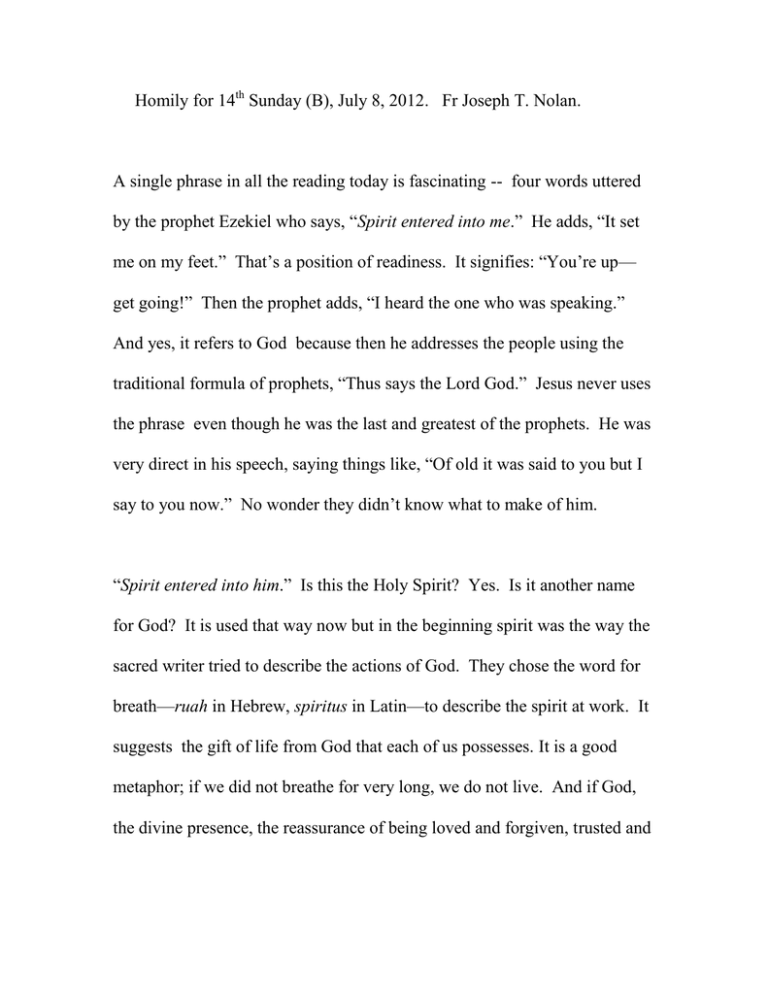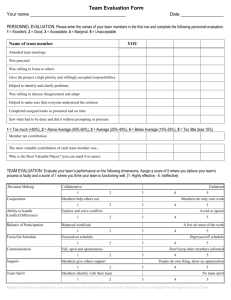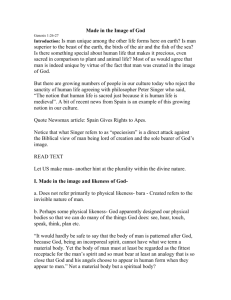Homily for 14
advertisement

Homily for 14th Sunday (B), July 8, 2012. Fr Joseph T. Nolan. A single phrase in all the reading today is fascinating -- four words uttered by the prophet Ezekiel who says, “Spirit entered into me.” He adds, “It set me on my feet.” That’s a position of readiness. It signifies: “You’re up— get going!” Then the prophet adds, “I heard the one who was speaking.” And yes, it refers to God because then he addresses the people using the traditional formula of prophets, “Thus says the Lord God.” Jesus never uses the phrase even though he was the last and greatest of the prophets. He was very direct in his speech, saying things like, “Of old it was said to you but I say to you now.” No wonder they didn’t know what to make of him. “Spirit entered into him.” Is this the Holy Spirit? Yes. Is it another name for God? It is used that way now but in the beginning spirit was the way the sacred writer tried to describe the actions of God. They chose the word for breath—ruah in Hebrew, spiritus in Latin—to describe the spirit at work. It suggests the gift of life from God that each of us possesses. It is a good metaphor; if we did not breathe for very long, we do not live. And if God, the divine presence, the reassurance of being loved and forgiven, trusted and called to work in the kingdom—if these are not present, we do not live very well as Christians. They also used wind as another metaphor for spirit because it is a figure of power, great power. We are not thinking so much of the whirlwind or the hurricane but of the wind moving the clouds and bringing the rain that brings forth life on earth. Thus we are told in Genesis that “the spirit of God moved over the waters and brought forth the dry land, the earth.” “Spirit entered into me.” Does the outpouring of genius in some fellow humans represent the Creator Spirit at work in them? They contribute so much to the world, the world of art or science or in any field---are we right in seeing the hand of God in all this? Is it more than genes and teachers and hard work? Take, for an astonishing example, the achievements of a man whose middle name means “lover of God.” Or, “Beloved of God.” Amadeus. Yes, Wolfgang Amadeus Mozart. The encyclopedia says of him, “He had an unsuccessful career and died young but ranks as one of the great geniuses of Western civilization.” Just a brief summary: at the age of six he wrote five piano pieces that are still very popular. At the age of eight he wrote a symphony. At ten, an oratorio. At fourteen he composed a serious opera and directed it in person when it was produced in Milan, Italy. (At this point we are tempted to ask ourselves what we were doing at the age of fourteen!) Before he died at age thirty-five he had written more than six hundred works of music. It was easier for him, of course, because he had perfect recall; he composed a melody in his head and retained it after writing it down. He rarely did anything like a rough draft. As perhaps you know, from seeing the film Amadeus. Mozart’s final years were struggles with poverty and illness. He never got to direct his three greatest symphonies, and he died of typhoid fever at the age of 36 while writing the great Requiem Mass. Even the site of his grave is unknown. I need not tell you that he lives on gloriously in his music. Mozart’s gigantic contribution might remind us of Jesus, who died even younger. One lives in his music; the other—Jesus—lives. He lives as the Risen One, present to us in grace, power, and love, a real presence. In his lifetime Jesus did not write music, he told stories called parables; and they have become the most repeated stories in the world. What we know of him we know from the gospels, and people who are not believers are amazed at the power of these slender documents and the extraordinary person they reveal. We think we know the answer to the genius of Jesus Christ; he was the Word become flesh and dwelling among us. In him, God has visited his people (and has never left us). In him, divine love became visible. In Mozart’s case, it was the Creator Spirit at work in his flesh, in his person, prompting those great works of beauty and truth he left with us. Just listen to a great voice sing Mozart’s Ave Maria. Or the slow tide of sound that begins the Kyrie of the Requiem Mass. Or the notes that fall like tumbling water in the piano concertos. Or the sheer delight of many of his compositions. Of Mozart, and perhaps of any great person, the crowd will ask those words in the gospel, “Where does he get all this?” And the answer? “Spirit entered into me!” And where did Jesus get all this? It is the same answer: he got it from God. The gospel tells of him as a young man about to begin his mission, declaring in the Temple, “The spirit of the Lord is upon me.” We can make that claim; we too are temples of the Holy Spirit. And each of us in our own lives, which are usually a lot longer than thirty-some years, can ask ourselves: how can I be creative? In many ways. A child, for instance, is a great creation— the greatest of all. So is a home, a family. The classroom is a creative place, where truth and wisdom are pursued. It has been rightly said that no one knows how far, even into eternity, the work of a great teacher goes. I once quoted that in tribute to Krister Stendahl, when I was privileged to drive him home from meetings at B.C. When Stendahl gave a major address we used to wait for the great epigrammatic line that would be quoted and expanded from then on. Two of them I have used in every theology course I taught. Even sitting so many hours before “the black box” (and combining 1 and 0 all over the place!) can be a response to the gift which the prophet describes: “Spirit entered into me.” All good work is how God is glorified, and creation goes on.







